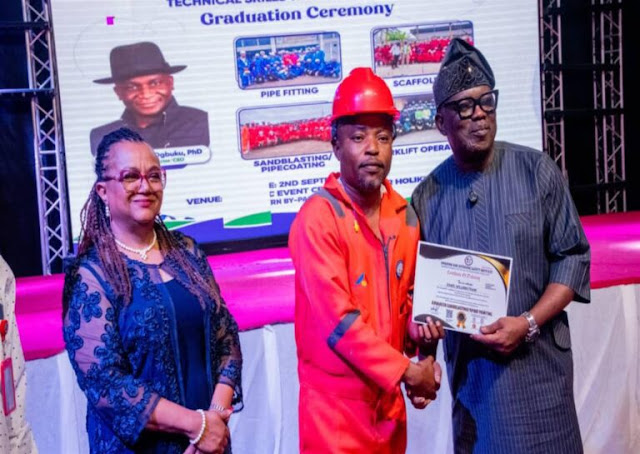In a landmark achievement for youth empowerment and regional development, the Niger Delta Development Commission (NDDC) has celebrated the graduation of 300 young men and women from its comprehensive skills acquisition training programme. The ceremony, held in Port Harcourt, Rivers State, marked the successful completion of a rigorous initiative aimed at equipping the region’s youth with practical, market-driven skills to foster self-reliance, entrepreneurship, and socio-economic progress. This milestone underscores the NDDC’s commitment to addressing unemployment, poverty, and underdevelopment in the Niger Delta, a region critical to Nigeria’s economic prosperity due to its vast oil and gas resources.
A Beacon of Hope for the Niger Delta
The Niger Delta, comprising nine states in Nigeria—Abia, Akwa Ibom, Bayelsa, Cross River, Delta, Edo, Imo, Ondo, and Rivers—has long been a paradox of wealth and want. Despite being the hub of Nigeria’s oil industry, which accounts for over 80% of the nation’s foreign exchange earnings, the region grapples with systemic challenges such as unemployment, environmental degradation, and limited access to quality education and training. These issues have fueled unrest, militancy, and economic stagnation, particularly among the youth, who form a significant portion of the region’s population.
Recognizing the urgent need to empower its youth, the NDDC launched the skills acquisition training programme as part of its broader mandate to facilitate sustainable development in the Niger Delta. The programme is designed to bridge the gap between the region’s abundant human potential and the opportunities available in various industries. By equipping participants with technical and vocational skills, the NDDC aims to create a new generation of entrepreneurs, professionals, and skilled workers capable of driving economic growth and reducing dependency on oil-related activities.
The Scope of the Training Programme
The recently concluded training programme targeted 300 youths from various communities across the Niger Delta. Participants underwent intensive training in a wide range of vocational and technical fields, carefully selected to align with the region’s economic needs and global market trends. These fields included welding and fabrication, information and communication technology (ICT), agriculture, fashion design, catering, and renewable energy technologies.
The programme was structured to combine theoretical instruction with hands-on practical experience, ensuring that graduates are not only knowledgeable but also proficient in their chosen trades. Industry experts, seasoned trainers, and professionals from both the public and private sectors facilitated the sessions, bringing real-world insights to the learning process. The NDDC collaborated with reputable training institutions and private organizations to deliver high-quality instruction, ensuring that participants received certifications recognized both locally and internationally.
Each participant was selected through a transparent and merit-based process, prioritizing individuals from underserved communities and those with a demonstrated commitment to personal and community development. The programme also emphasized gender inclusivity, with a significant number of female participants, reflecting the NDDC’s recognition of the critical role women play in the region’s socio-economic transformation.
The Graduation Ceremony: A Moment of Pride
The graduation ceremony, held at a prestigious venue in Port Harcourt, was a vibrant celebration of achievement, resilience, and hope. Dignitaries in attendance included representatives from the NDDC, state government officials, community leaders, and industry stakeholders. The event was marked by speeches, cultural performances, and the presentation of certificates and starter kits to the graduates, equipping them to launch their careers or businesses immediately.
In his keynote address, the NDDC Managing Director, Dr. Samuel Ogbuku, congratulated the graduates for their dedication and perseverance throughout the training. He emphasized that the programme was not merely about imparting skills but about transforming lives and building a sustainable future for the Niger Delta. “You are the future of this region,” Dr. Ogbuku told the graduates. “The skills you have acquired are tools for empowerment, and we believe you will use them to create opportunities for yourselves and others.”
The Managing Director also highlighted the NDDC’s broader vision, which includes fostering entrepreneurship, creating job opportunities, and promoting peace and stability in the region. He noted that the skills training programme is part of a holistic strategy that includes infrastructure development, environmental remediation, and community engagement initiatives.
Voices of the Graduates
The graduates themselves were the true stars of the event, their stories reflecting the transformative impact of the programme. For many, the training represented a lifeline, offering them a chance to break free from the cycle of poverty and unemployment. One graduate, Ebiere Okonkwo, a 24-year-old from Bayelsa State, shared her journey of learning fashion design. “Before this programme, I had no clear path,” she said. “Now, I can sew, design, and even teach others. I’m ready to start my own business and contribute to my community.”
Another graduate, Emmanuel Okon, trained in ICT, spoke about how the programme opened his eyes to the possibilities of the digital economy. “I learned how to code and manage IT systems,” he said. “This is a game-changer for me. I want to develop solutions that can help businesses in the Niger Delta grow.” Emmanuel’s story is particularly inspiring, as he comes from a fishing community where opportunities for tech-related careers are scarce.
Female graduates, in particular, expressed gratitude for the programme’s inclusivity. Blessing Ekanem, who trained in catering, noted that the skills she acquired have given her the confidence to pursue her dream of owning a catering business. “I never thought I could achieve something like this,” she said. “The NDDC has shown me that women can excel in any field.”
Economic and Social Implications
The graduation of 300 skilled youths is a significant step toward addressing the high unemployment rate in the Niger Delta, which has been a persistent challenge for decades. According to the National Bureau of Statistics, youth unemployment in Nigeria hovers around 40%, with the Niger Delta facing even higher rates due to limited industrial activity and infrastructure deficits. By equipping young people with marketable skills, the NDDC is not only reducing unemployment but also fostering entrepreneurship, which has the potential to create ripple effects across the region.
The programme’s focus on diverse sectors such as agriculture and renewable energy is particularly strategic. The Niger Delta’s fertile lands and waterways make it an ideal region for agricultural development, yet the sector has been underutilized due to a lack of modern skills and investment. By training youths in modern farming techniques, agribusiness, and value-chain development, the NDDC is positioning the region to diversify its economy and reduce reliance on oil.
Similarly, the inclusion of renewable energy training reflects a forward-thinking approach. As the global energy landscape shifts toward sustainability, skills in solar, wind, and other renewable energy technologies position Niger Delta youths to tap into emerging markets. This aligns with Nigeria’s national goals of transitioning to cleaner energy sources and meeting its commitments under the Paris Agreement.
The ICT component of the programme is equally critical. In an increasingly digital world, proficiency in ICT opens doors to opportunities in software development, cybersecurity, and e-commerce. For a region often marginalized in Nigeria’s tech ecosystem, this training provides a pathway for Niger Delta youths to compete on a national and global stage.
Challenges and the Path Forward
While the NDDC’s skills training programme is a commendable initiative, it is not without challenges. One significant hurdle is the need for sustained funding to scale up the programme and reach more youths. With millions of young people in the Niger Delta, the current cohort of 300 represents a small fraction of those in need of similar opportunities. Expanding the programme will require increased budgetary allocations, partnerships with private sector players, and support from international development agencies.
Another challenge is the need for post-training support. While the provision of starter kits is a positive step, many graduates will require access to capital, mentorship, and market linkages to fully realize their potential. The NDDC has acknowledged this and is exploring partnerships with microfinance institutions, business incubators, and industry associations to provide ongoing support to graduates.
Additionally, the region’s infrastructural deficits, such as poor road networks and unreliable power supply, could hinder graduates’ ability to establish and sustain businesses. Addressing these systemic issues will require coordinated efforts between the NDDC, state governments, and the federal government.
Community and Stakeholder Perspectives
Community leaders and stakeholders have hailed the NDDC’s initiative as a game-changer for the Niger Delta. Chief Joseph Amakiri, a traditional ruler from Delta State, described the programme as “a blessing to our people.” He urged the NDDC to sustain and expand the initiative, noting that empowering youths is key to reducing crime and militancy in the region.
Private sector representatives also expressed optimism about the programme’s potential to bridge the skills gap in the Niger Delta. Mrs. Funmi Adebayo, a Port Harcourt-based entrepreneur, noted that the graduates’ skills align with the needs of industries in the region. “We need more welders, IT experts, and agricultural entrepreneurs,” she said. “This programme is producing the workforce we need to grow our economy.”
The Broader Vision of the NDDC
The skills training programme is just one facet of the NDDC’s multifaceted approach to transforming the Niger Delta. Established in 2000, the commission is tasked with facilitating the rapid and sustainable development of the region through infrastructure projects, human capital development, and environmental protection. Over the years, the NDDC has faced criticism for inefficiencies and allegations of mismanagement, but recent reforms under Dr. Ogbuku’s leadership have sought to reposition the agency as a catalyst for change.
In addition to skills training, the NDDC is investing in projects such as road construction, electrification, and healthcare facilities to improve the quality of life in the Niger Delta. The commission is also prioritizing environmental remediation to address the devastating effects of oil spills and pollution, which have decimated livelihoods in many communities.
Looking Ahead: A Call to Action
The graduation of 300 Niger Delta youths from the NDDC’s skills training programme is a testament to the power of targeted interventions in addressing systemic challenges. However, the journey is far from over. To sustain the programme’s impact, the NDDC must continue to engage with stakeholders, including government agencies, private sector players, and international partners, to secure the resources and expertise needed to scale up its efforts.
For the graduates, the ceremony marks the beginning of a new chapter. Armed with skills, certifications, and starter kits, they are poised to become agents of change in their communities. Their success will depend not only on their individual efforts but also on the enabling environment provided by the government and other stakeholders.
The Niger Delta stands at a critical juncture. With its vast natural and human resources, the region has the potential to become a hub of innovation, entrepreneurship, and sustainable development. The NDDC’s skills training programme is a vital step toward realizing this vision, offering hope to a generation eager to rewrite the narrative of their region.
As the graduates step into the world, they carry with them not only skills but also the dreams of their communities. Their success will be a measure of the NDDC’s commitment and a beacon of hope for the millions of youths still waiting for opportunities to shine. In the words of Dr. Ogbuku, “This is just the beginning. Together, we will build a Niger Delta that works for everyone.”






